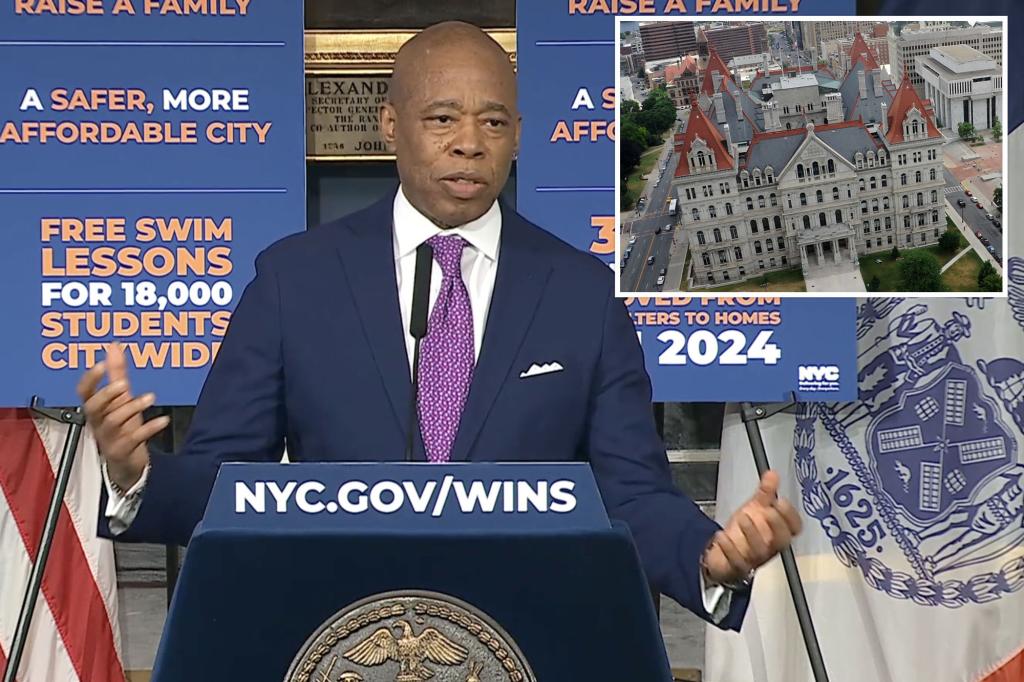Mayor Adams Urges Albany to Address NYC’s Budget Crisis Amid Recidivism Concerns
In a critical moment for New York City, Mayor Eric Adams has made a fervent appeal to state lawmakers in Albany, urging them to take immediate and effective action as the city grapples with a severe budget crisis. This call to action comes amidst rising tensions and stalled negotiations, highlighting a troubling disconnect between city leaders and state lawmakers regarding pressing public safety issues, particularly the ongoing challenge of recidivism.
The Budget Crisis: An Overview
The budget crisis in New York City has been brewing for some time, exacerbated by a series of economic challenges, including the fallout from the COVID-19 pandemic and rising inflation. With the city’s expenditures outpacing its revenues, Mayor Adams has warned that a failure to address this crisis could have dire consequences for public safety and the well-being of New Yorkers.
As negotiations in Albany stagnate, the mayor has expressed frustration, stating that the urgency of the situation is not being fully recognized by some lawmakers. He emphasized that the implications of the budget crisis extend beyond mere numbers; they impact the quality of life for all New Yorkers, particularly in neighborhoods that are already vulnerable.
Recidivism: A Critical Issue
At the heart of Mayor Adams’ appeal is the issue of recidivism, which refers to the tendency of formerly incarcerated individuals to re-offend. This cyclical problem poses a significant challenge to public safety and has been a focal point of the mayor’s administration. He argues that without adequate funding and support systems, efforts to reduce recidivism will falter, leading to increased crime rates and jeopardizing the safety of communities.
- Recidivism rates in New York City have remained stubbornly high, with many individuals returning to prison within three years of their release.
- Studies indicate that access to education, job training, and mental health services are crucial in breaking the cycle of re-offending.
- Mayor Adams has called for increased investment in these areas as part of the city’s budget plan.
The Disconnect with Lawmakers
Mayor Adams has pointed out a concerning disconnect between the realities faced by New Yorkers and the priorities set by some state lawmakers. He underscored that while discussions around the budget often focus on fiscal responsibility, the human element—namely, the safety and rehabilitation of individuals—must also be prioritized.
During a recent press conference, Adams stated, “We cannot afford to turn a blind eye to the issues that face our communities. The budget must reflect our commitment to public safety, which includes tackling the recidivism crisis head-on.” This sentiment resonates with many community leaders who feel that the current approach to public safety is insufficient.
The Importance of Investment in Social Programs
Mayor Adams has advocated for increased funding to social programs aimed at preventing recidivism. These programs may include:
- Job Training Initiatives: Providing skills training that helps former inmates secure stable employment.
- Mental Health Services: Offering mental health support to address underlying issues that may contribute to criminal behavior.
- Community Outreach Programs: Engaging with communities to foster support networks for individuals returning from incarceration.
By investing in these areas, the city can not only reduce recidivism but also enhance overall public safety. The mayor’s vision aligns with evidence-based practices that show how proactive measures can lead to significant reductions in crime rates.
Collaboration Between City and State
As the budget negotiations continue, it is vital for city officials and state lawmakers to collaborate effectively. Mayor Adams emphasizes that meaningful dialogue is essential for addressing the complexities of the budget crisis and its connection to public safety. A unified approach can lead to innovative solutions that serve the best interests of New Yorkers.
“We need to work together,” Adams said. “This is not just about numbers; it’s about people. We have a responsibility to ensure that our communities are safe and that we provide the necessary resources for rehabilitation.”
The Path Forward: A Call to Action
In light of the challenges ahead, Mayor Adams’ call for action serves as a crucial reminder of the intertwined nature of fiscal health and public safety. As the city approaches a critical juncture in its budget negotiations, lawmakers must consider the long-term implications of their decisions.
It is essential for state leaders to recognize the importance of addressing recidivism as part of a comprehensive public safety strategy. By prioritizing funding for social programs, enhancing community engagement, and fostering collaboration between government entities, New York City can pave the way toward a safer future.
Conclusion
Mayor Adams’ urgent plea to Albany reflects a deep understanding of the challenges facing New York City today. As budget negotiations stall, the focus must remain on what truly matters: the safety and well-being of all citizens. Addressing the budget crisis alongside the recidivism issue will not only demonstrate fiscal responsibility but also reaffirm the city’s commitment to justice and rehabilitation.
In the coming weeks, as discussions continue, it is imperative that all stakeholders remain engaged and proactive in finding solutions. The future of New York City depends on it, and with concerted efforts from both city and state leaders, there is hope for a brighter, safer tomorrow.
See more BBC Express News

